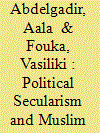| Srl | Item |
| 1 |
ID:
186693


|
|
|
|
|
| Summary/Abstract |
How do social group boundaries evolve? Does the appearance of a new out-group change the in-group’s perceptions of other out-groups? We introduce a conceptual framework of context-dependent categorization in which exposure to one minority leads to recategorization of other minorities as in- or out-groups depending on perceived distances across groups. We test this framework by studying how Mexican immigration to the United States affected white Americans’ attitudes and behaviors toward Black Americans. We combine survey and crime data with a difference-in-differences design and an instrumental variables strategy. Consistent with the theory, Mexican immigration improves whites’ racial attitudes, increases support for pro-Black government policies, and lowers anti-Black hate crimes while simultaneously increasing prejudice against Hispanics. Results generalize beyond Hispanics and Blacks, and a survey experiment provides direct evidence for recategorization. Our findings imply that changes in the size of one group can affect the entire web of intergroup relations in diverse societies.
|
|
|
|
|
|
|
|
|
|
|
|
|
|
|
|
| 2 |
ID:
191986


|
|
|
|
|
| Summary/Abstract |
When does collective memory influence behavior? We highlight two conditions under which the memory of past events comes to matter for the present: the associative nature of memory and institutionalized acts of commemoration by the state. During World War II, German troops occupying Greece perpetrated numerous massacres. Memories of those events resurfaced during the 2009 Greek debt crisis, leading to a drop in German car sales in Greece, especially in areas affected by German reprisals. Differential economic performance did not drive this divergence. Multiple pieces of evidence suggest that current events reactivated past memories, creating a backlash against Germany. This backlash also manifested in political behavior, with vote shares of anti-German parties increasing in reprisal areas after the start of the debt crisis. Using quasi-random variation in public recognition of victim status, we show that institutionalized collective memory amplifies the effects of political conflict on economic and political behavior.
|
|
|
|
|
|
|
|
|
|
|
|
|
|
|
|
| 3 |
ID:
165419


|
|
|
|
|
| Summary/Abstract |
I study the effect of taste-based discrimination on the assimilation decisions of immigrant minorities. Do discriminated minority groups increase their assimilation efforts in order to avoid discrimination and public harassment or do they become alienated and retreat in their own communities? I exploit an exogenous shock to native attitudes, anti-Germanism in the United States during World War I, to empirically identify the reactions of German immigrants to increased native hostility. I use two measures of assimilation efforts: naming patterns and petitions for naturalization. In the face of increased discrimination, Germans increase their assimilation investments by Americanizing their own and their children’s names and filing more petitions for US citizenship. These responses are stronger in states that registered higher levels of anti-German hostility, as measured by voting patterns and incidents of violence against Germans.
|
|
|
|
|
|
|
|
|
|
|
|
|
|
|
|
| 4 |
ID:
174454


|
|
|
|
|
| Summary/Abstract |
In response to rising immigration flows and the fear of Islamic radicalization, several Western countries have enacted policies to restrict religious expression and emphasize secularism and Western values. Despite intense public debate, there is little systematic evidence on how such policies influence the behavior of the religious minorities they target. In this paper, we use rich quantitative and qualitative data to evaluate the effects of the 2004 French headscarf ban on the socioeconomic integration of French Muslim women. We find that the law reduces the secondary educational attainment of Muslim girls and affects their trajectory in the labor market and family composition in the long run. We provide evidence that the ban operates through increased perceptions of discrimination and that it strengthens both national and religious identities.
|
|
|
|
|
|
|
|
|
|
|
|
|
|
|
|